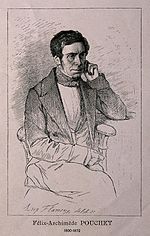Félix Archimède Pouchet
| Félix Archimède Pouchet | |
|---|---|

Félix Archimède Pouchet
|
|
| Born | 26 August 1800 Rouen |
| Died | 6 December 1872 (aged 72) |
| Nationality | France |
| Fields | Natural history |
| Institutions | Rouen Museum of Natural History |
| Known for | spontaneous generation |
Félix-Archimède Pouchet (26 August 1800 – 6 December 1872) was a French naturalist and a leading proponent of spontaneous generation of life from non-living materials, and as such an opponent of Louis Pasteur's germ theory. He was the father of Georges Pouchet (1833–1894), a professor of comparative anatomy.
From 1828 he was director of the Rouen Jardin des Plantes. Later, in 1838, he became professor at the School of Medicine at Rouen. His major scientific work Hétérogénie was published in 1859. He also wrote a layperson's encyclopedia The Universe, published in 1870, which gives an overview of the sciences, but in which Pouchet ridicules Louis Pasteur's theories (calling them panspermism) and atomic theory.
In 1847, Pouchet effectively launched the study of the physiology of cytology.
Pouchet was born in Rouen, France, on August 26, 1800. His father was a respected manufacturer in Rouen. In 1827, Pouchet received his M.D. in Paris, and later became the director of the Rouen Museum of Natural History. He also held a chair at one of the local medical preparatory colleges in Rouen in the field of zoology, and in 1843, he received the Legion of Honour.
Pouchet had extensive experience in the field of traditional biology before the debate, where his main interest was animal generation. In the 1840s, he published two scientific articles. Both publications seemed to contradict his eventual support of spontaneous generation. In these publications, he believed that in the animal kingdom, generation happened through eggs that existed before fertilization. He also demonstrated reservations in spontaneous generation by supporting the beliefs of Christian Ehrenberg. Ehrenberg believed that infusoria had complex organ systems while other protozoologists, like Fèlix Dujardin, believed that infusoria were simple organisms that could appear spontaneously. Pouchet did not seem very interested in spontaneous generation during this time, and instead studied ovule production and menstruation.
...
Wikipedia
